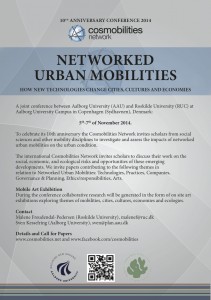Networked Urban Mobilities Conference and Mobile Art Exhibition 2014
Registration is now open! Please follow this link to register
Keynotespeakers for the conference will be:
John Urry Professor of Sociology & director of CeMoRe, Lancaster University
Mimi Sheller Professor of Sociology & director at MCenter Drexel University
Vincent Kaufmann Professor & director of LaSUR Polytechical University of Lausanne
Stephen Graham Professor of Cities and Society, Newcastle University

Networked Urban Mobilities
How new technologies change cities, cultures and economies
5-7th of November 2014 Venue: Aalborg University Campus in Copenhagen, DK Joint hosts: Aalborg University & Roskilde UniversityTo make cities places of lived social, economic and ecological sustainability, it needs strong and socially inclusive mobility systems. To celebrate its 10th anniversary the Cosmobilities Network invites scholars from social sciences and other mobility relevant disciplines to investigate and assess the impacts of networked urban mobilities on the urban condition.
Cities and regions are constituted by complex settings of social, technological, geographical, cultural, and digital networks of mobility (Graham, Marvin 2009). The urban scale is an essential part of the global ‘network society’ (Castells 1996) with new forms of social and cultural life emerging and with strong impacts on the ecological conditions. The great crash from 2007-8 onwards, means that future mobilities are going to be developing in a resource-constrained world. Excessively consuming infrastructural developments are highly risky for the future of modern societies. Thus, innovation in policies, products, services, and technologies is needed to tackle climate change and increasing urban social and economic challenges. An approach is required which bridges research disciplines and analyses societal consequences of path dependencies, funding decisions and technology policies.
When mobility is made plural and becomes mobilities it stems from the newly emerging field of interdisciplinary Mobilities research (Urry, Sheller 2006; Canzler, Kaufmann, Kesselring 2008; Grieco, Urry 2012). The concept of ‘mobilities’ (Urry 2000) encompasses the large-scale movements of people, goods, capital, and information, as well as the more local processes of daily transportation, communication and the travel of artefacts. These different mobilities are considered fundamental in framing modern social life and urban cultures in particular. All this demands better theory and empirical research to examine the interdependencies between changes in physical movement, electronic communication and their increasing convergence and potential substitution of travel and transport.
Against this background, the international Cosmobilities Network invites researchers and scholars to celebrate its anniversary and discuss their work on the social, economic, and ecological risks and opportunities of these emerging developments. The conference addresses these challenges and calls for the exchange of ideas on how to significantly improve the conditions for life in urban spaces.
We invite papers contributing to the following themes in relation to Networked Urban Mobilities:
Technologies: ‘Seamless mobility’ is a historically grown vision held by architects, planners, and engineers. Optimizing city spaces for the mobility of people, vehicles, goods and so on, with minimum loss of time and energy, has mobilized innovation, capital and entrepreneurial capacities.
Practices: Networked urban mobility infrastructures enable and limit everyday mobile practices of people at the same time. Based upon advanced mobile devices, people can manage complex arrangements of socio-spatial organization, scheduling, and negotiations.
Companies: For the sustainability of urban mobilities modification within companies are a key issue. The rise of the Internet and the spread of mobile computers and mobile phones, as well as recent developments such as Cloud computing have been mobilizing businesses in a way not imaginable only some years ago.
Governance & Planning: The need for sustainable mobilities in urban environments pressures urban politics. ‘Reflexive governance’ and the capacity to allocate expertise and knowledge at the right place and to the right time, is prerequisite for developing non-destructive future-oriented strategies for low carbon and socially inclusive mobilities.
Ethics/responsibilities: Considerations and systematic analysis of the ethical implication of mobility solutions is a research deficit. I.e. overcoming automobility and car-dependency in the Western societies without offering alternative ways of transport in rural areas. Or the use of ICT’s both in mobility research in form of mobile methods and in the application of mobility solutions such as Intelligent Transport Systems highlights problems of surveillance and privacy.
Arts: Art is yet another point of departure for the Cosmobilities Network towards a transdisciplinary perspective in Mobilities research. We explicitly call for artistic contributions on mobility from fine arts, music, film, writing, performance arts etc.
Mobile Arts Exhibitions: During the conference collaborative research will be generated in the form of on site exhibitions exploring themes of mobilities, cities, cultures, economies and ecologies. The exhibitions will inform and be informed by the discussions at the conference and establishing productive relationships between objects, media, places, landscapes, technologies and atmospheres
The open call has closed, but we now invite abstracts for the following thematic sessions:
Cycling Futures
Mobility in the arts
New Corporate Mobility Regimes
Planning Mobilities
Energy Transition and E-mobility: a Chance for Convergence?
Doing Ethnography in Hyper Mobile Fields: Methodological Challanges
Embodied Mobility Practices and Everyday Life
Urbanization in “non-urban” Space: the role of Mobilities in new Urban Epistemologies
Art as Mobile Research: The Journey of Making
Abstracts of no more than 300 words should be submitted to Malene Freudendal-Pedersen (Roskilde University), malenef@ruc.dk or Sven Kesselring (Aalborg University), sven@plan.aau.dk no later than the 28th of May 2014.
Organization Team
Malene Freudendal-Pedersen (RUC), Sven Kesselring (AAU), Line Thorup (RUC), Enza Lissandrello (AAU), Aslak Aamot Kjærulff (RUC), Katrine Hartmann Petersen (RUC), Dorte Norgaard Madsen (AAU) and Birgitte Steen Hansen (RUC).
Scientific Committee
Malene Freudendal-Pedernsen (RUC), Ole B. Jensen (AAU), Lise Drewes Nielsen (RUC), Kevin Hannam (Leeds University), Sven Kesselring (AAU), Katharina Manderscheid (Universiät Luzern)
